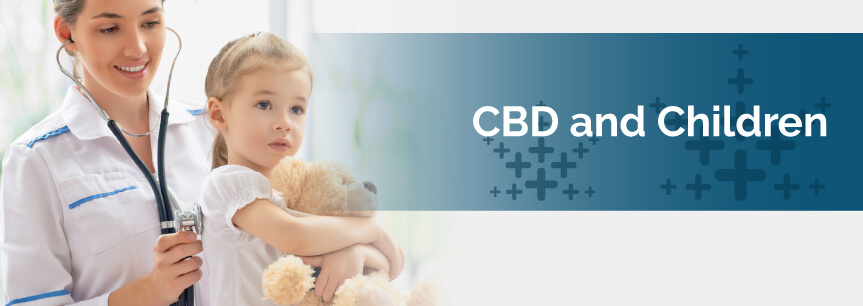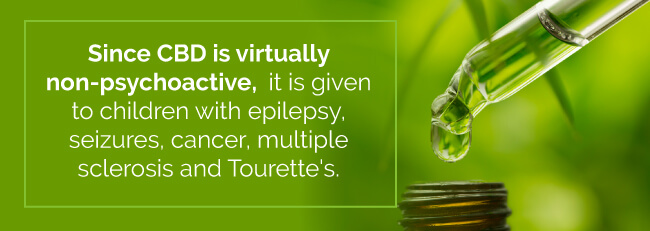
Cannabidiol (CBD) is one of 60+ chemical compounds found in marijuana that, along with tetrahydrocannabinols, or THC, gives marijuana most of its psychoactive and medicinal qualities. Different species or “strains” of marijuana contain different amounts of CBD and THC, with strains cultivated for medical purposes tending to contain more CBD than THC.
Alternately, pot cultivated mainly for recreational use contains more THC than CBD. However, some cannabis strains contain equal amounts of CBD and THC to address specific symptoms requiring medicinal benefits of both CBD and THC.
Currently, 16 states allow certified medical marijuana doctors to write cannabis recommendations for children with chronic disorders that do not respond to traditional medications. Since CBD is virtually non-psychoactive, medical marijuana given to children with epilepsy, seizures, cancer, multiple sclerosis and Tourette’s syndrome provides appropriate amounts of CBD to treat their symptoms.

Most of these states have regulations determining the amount of THC allowable in cannabis given to children with serious illnesses. In Delaware, for example, dispensaries must ensure medical marijuana for children contains no more than seven percent THC.
According to an article in the British Journal of Clinical Pharmacology, CBD offers a variety of medicinal benefits. In addition to suppressing seizure/severe muscle spasm activity, CBD also helps reduce nausea and vomiting, relieves systemic inflammation and may exert antioxidant/anti-tumor properties.
In addition, some new research results indicate that CBD is involved with reducing the psychoactive effects of THC, especially the interference with memory and learning.
Several strains of cannabis are available that contain at least 20 percent CBD. One of the highest CBD-containing strains of pot is called “Charlotte’s Web,” named by its makers for its ability to suppress unrelenting epileptic seizures in a little girl named Charlotte.
This oil-based cannabis extract proved to be so successful that parents from all over the U.S. soon traveled to Colorado to obtain the strain for their children with Dravet syndrome or epilepsy.
A survey of parents with children suffering Dravet Syndrome, a type of epilepsy resistant to conventional treatment, found that providing their children with CBD-enriched cannabis experienced an 80 percent reduction in epileptic seizures. In addition, parents reported no side effects and increased alertness in their children who had previously been taking medications that made them drowsy and lethargic.
Dravet syndrome is a lifelong, often catastrophic type of epilepsy emerging during a child’s first year of life. Prolonged and frequent seizures debilitate children with Dravet Syndrome, and the disease can cause developmental delays, growth problems and recurring infections. In many cases, children with Dravet Syndrome do not live into adulthood due to the neurological damage the disease causes.
Another study conducted by the American Epilepsy Society involved 261 people, most of them children, who had been diagnosed with severe epilepsy but were not responding well to pharmaceutical medications. After three months of taking cannabidiol, nearly 50 percent of study participants experienced at least a 50 percent reduction in epileptic/neurological seizures. Minimal side effects such as dry mouth and increased appetite were reported by a few participants. Astonishingly, nine percent of those taking CBD were actually seizure-free following completion of the study.
Cannabidiol remains illegal at the federal level in the United States. The DEA classifies CBD as a Schedule I drug, which includes all forms of extracts containing CBD.
Last year, the FDA did approve a request from GW Pharmaceuticals to begin clinical trials on Epidiolex, a CBD-based drug meant to relieve epileptic seizures. If approved, physicians could prescribe this drug to children suffering severe or treatment-resistant seizures. GW Pharmaceuticals produces another marijuana-based medication called Sativex that has already been approved for use in children and adults in over 20 countries for relieving symptoms of multiple sclerosis.
The U.S. Drug Enforcement Administration is in the process of establishing a new Administration Controlled Substances Code Number designating a compound as a “marijuana extract.” This allows the DEA to monitor how much CBD and THC is contained in a pot product.
While the DEA has always had different codes for tetrahydrocannabinols and marijuana, this is the first time it has given marijuana extracts a code number. According the DEA, the definition of a marijuana extract is “any extract containing multiple cannabinoids derived from plants of the genus Cannabis, other than separated resin (purified or crude) obtained from a plant.”
Regardless, extracts of marijuana will continue being illegal to possess or consume at the federal level under Schedule I guidelines.
In states where children under 18 are diagnosed with chronically severe diseases and disorders, medical marijuana can be given to children by parents or legal guardians who are responsible for obtaining consumable pot products — food, oil, drops, etc. — containing high amounts of CBD. No states allow children to smoke marijuana for medical purposes. In states where medical marijuana is permitted for use by children, parents usually rely on dispensaries to provide them with CBD drops that are easy to administer with an eye dropper.
MarijuanaDoctors.com is the leading resource for medical marijuana patients searching for doctors who are certified to write recommendations for medical cannabis products in their state. Doctors with a medical marijuana certification also rely on our website to reach as many eligible patients as possible interested in using marijuana for relieving symptoms of a severe, chronic disease. We also help marijuana patients obtain their state marijuana registry card, find dispensaries in their state and assist with streamlining the process of becoming a legally registered, medical marijuana patient.
Finding the resources, doctors and dispensaries for your medical marijuana needs has never been easier. Contact us today to get answers to your questions within 24 hours.
No Information on MarijuanaDoctors.Com should be used to diagnose, treat, prevent or cure any disease or condition. You can view our Full Disclaimer here.